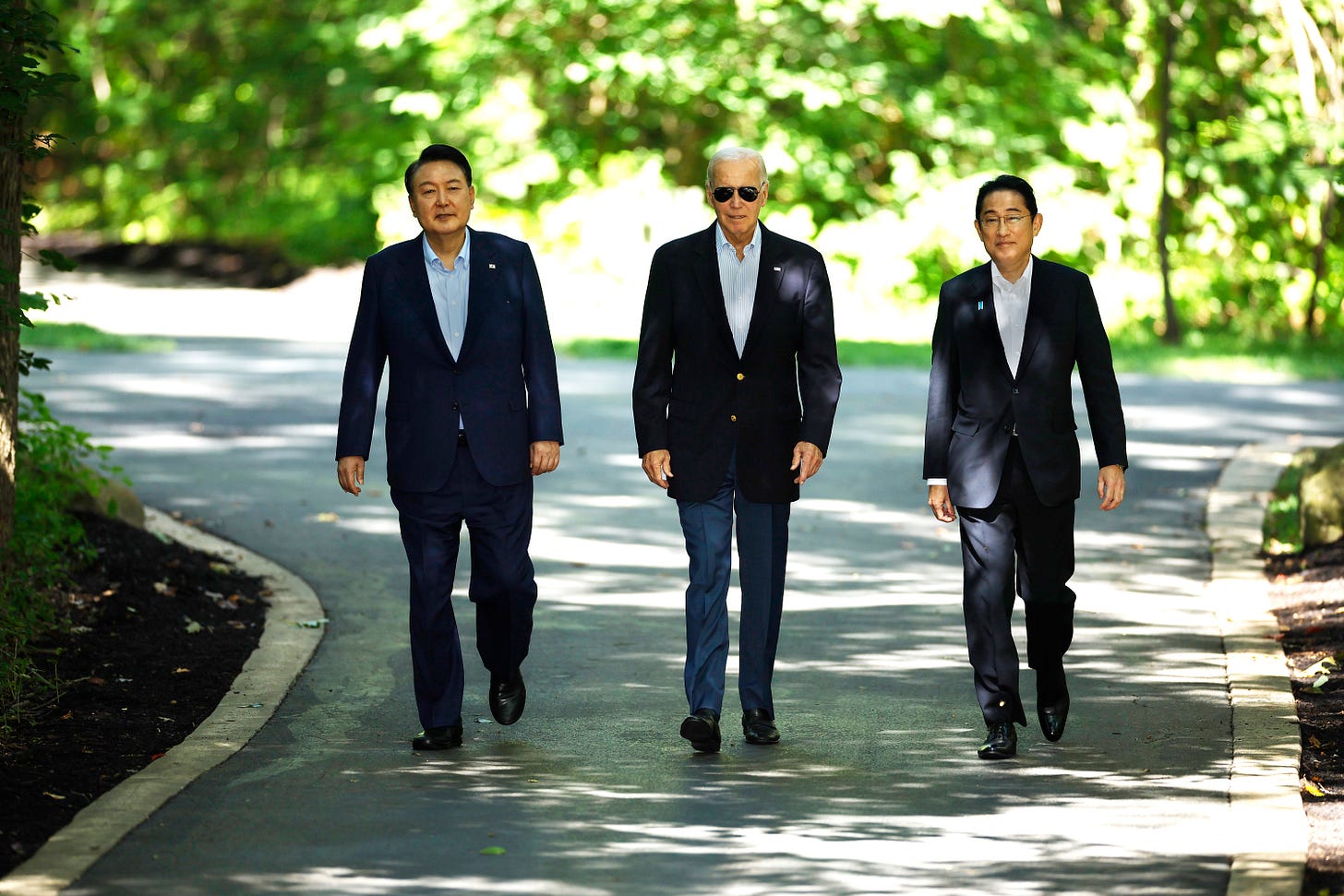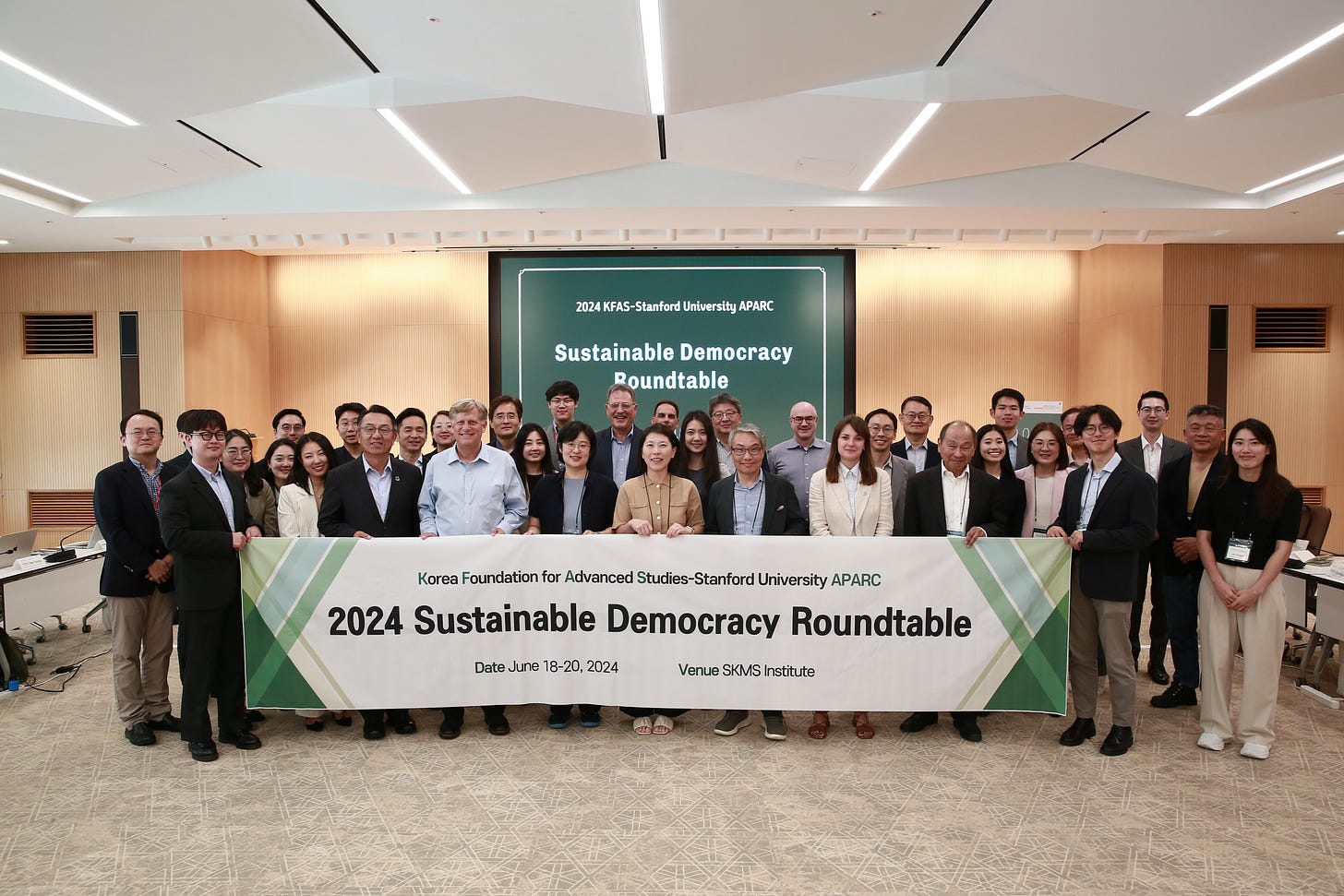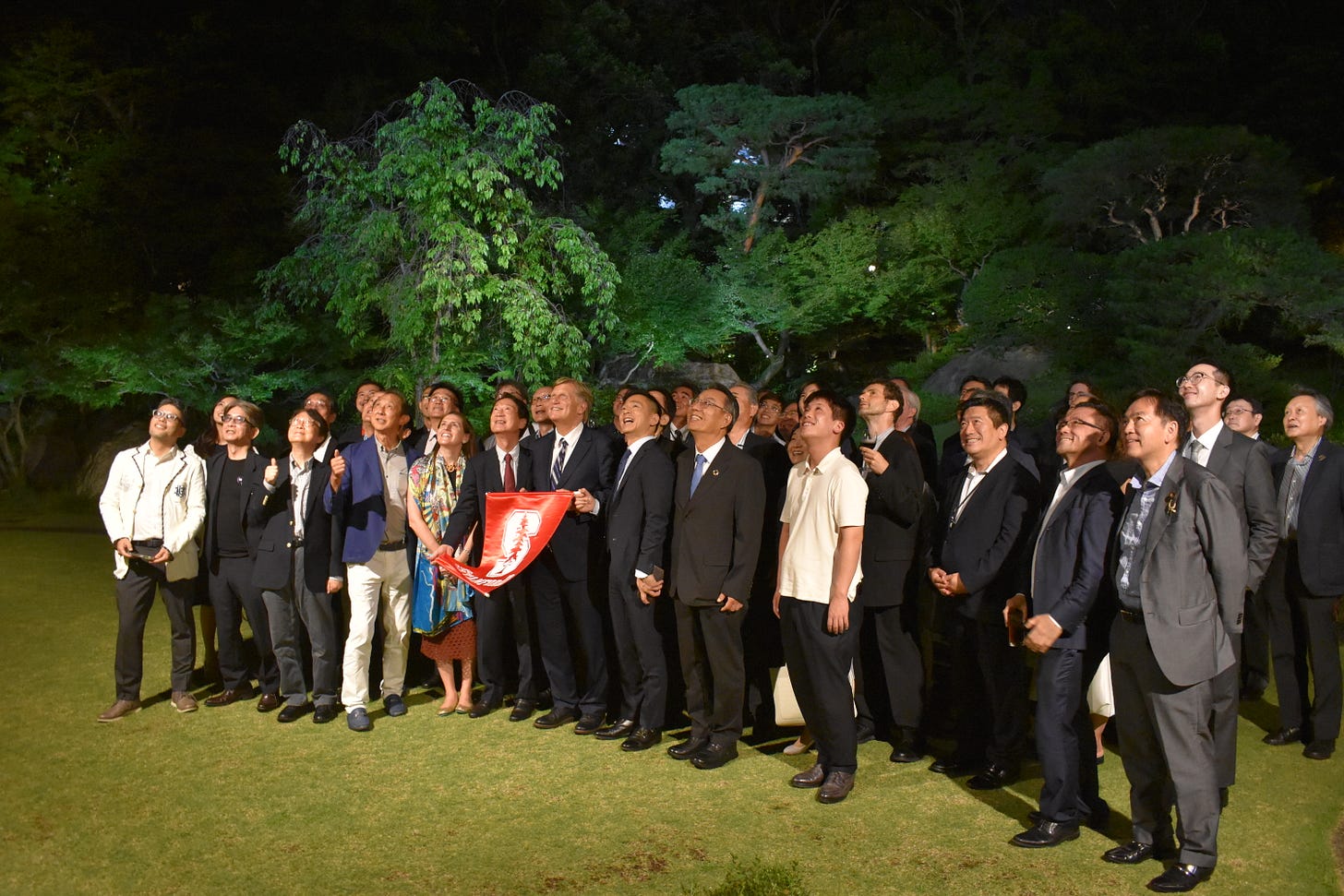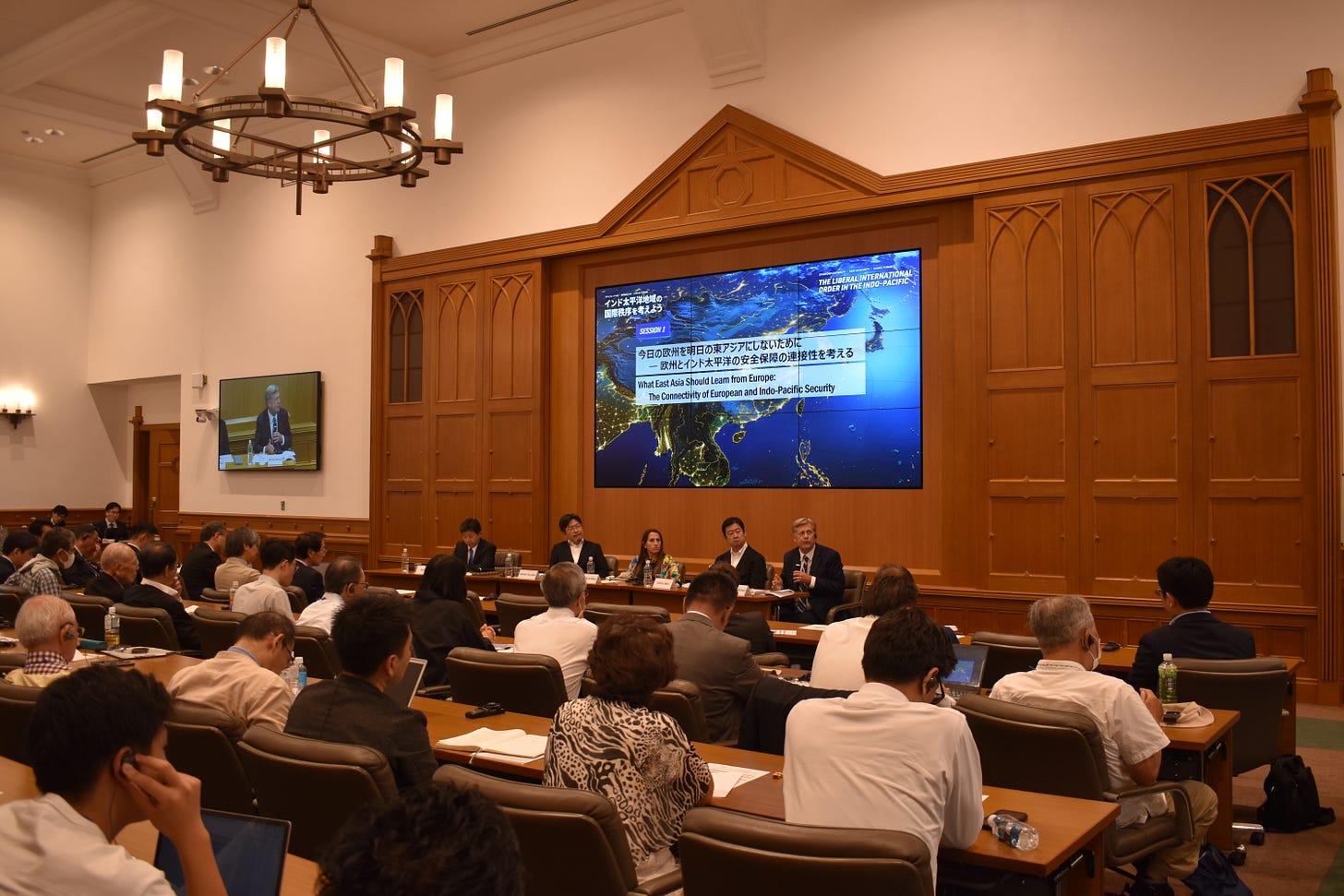The Paramount Importance of Allies
My BLUF (Bottom Line Up Front) from 10 days in South Korea and Japan.
I just got back from a 10-day trip to South Korea and Japan. I returned home with many new impressions which I will share in future columns. My biggest takeaway, however, was the paramount importance of allies for advancing U.S. national interests. Compared to China and Russia in this new era of great power competition, our greatest advantage is our strong allies. That is true in Europe. It is also true in Asia.
Right after I landed in Seoul, Putin showed up in Pyongyang. That was a coincidence! While I previously have been to South Korea many times, this was Putin’s first visit to North Korea in the last two decades. During his visit, Kim Jong Un and Putin signed a new “DPRK-Russia Treaty on Comprehensive Strategic Partnership,” ushering in a new era of closer ties between these two dictatorships. This is the money paragraph in this new treaty:
In case any one of the two sides is put in a state of war by an armed invasion from an individual state or several states, the other side shall provide military and other assistance with all means in its possession without delay in accordance with Article 51 of the UN Charter and the laws of the DPRK and the Russian Federation.
This commitment to help each other out in war is new. While it is clear that Putin visited to secure military assistance – first and foremost, munitions – from North Korea to continue his invasion of Ukraine, we do not know yet what Kim Jong Un got in return. Several South Korean national security experts, with whom I met in Seoul, worriedly speculated that Putin probably signaled his willingness to provide technologies to help upgrade North Korea’s nuclear weapon program. If true, this would be a fundamental shift in Russia-North Korea relations.
As these autocrats deepen their cooperation, we, the democrats, are doing the same and need to do more. In South Korea, the United States has a loyal and powerful ally. Our ties are not just based on convenient transactions but on democratic values. Shared values about democracy and human rights came up in almost every conversation I had in Seoul last week. As South Korean officials began to debate ways to respond to this new Russia-North Korea treaty, including a decision to consider providing lethal assistance to Ukraine, it was clear to me that their response would be closely coordinated with the United States, and rightfully so. Americans and South Koreans are stronger together than alone. We, in turn, should reaffirm our commitment to deter an attack, including a nuclear attack, from North Korea, first in words and then by deploying weapons and soldiers to the region to keep the peace.
In fact, the entire democratic world is stronger together in confronting security and economic challenges from the autocratic world. While in Seoul, many of my interlocutors explained what a momentum pivot South Korea made, when President Yoon agreed to participate in a trilateral summit between the United States, Japan, and South Korea last year at Camp David. Yoon and Japanese Prime Minister Kishida then agreed to appear on the same stage at Stanford last fall (read our report here). Given Japan’s history of colonization and abuse of South Koreans – especially South Korean women during World War II – it was not easy for Yoon to make these decisions. At home, as a result, his popularity suffered. But he decided to pursue greater cooperation with Japan to strengthen a collective response from democratic allies to address first and foremost the China threat as well as the growing North Korean and Russia threat. Responding together is better than responding alone. In Seoul, I heard all sorts of creative ideas for how South Korea might further bolster our collective defense against China, including, most ambitiously, by helping strengthen the U.S. Navy through shipbuilding or joint production of munitions and weapons to supply American allies worldwide. South Korea today is a major economy with deep manufacturing capacity. We need creative thinking about leveraging this economic powerhouse for the good of our security interests. But there is no doubt that the American interests are best served with a strong alliance with South Korea.
The same is true with Japan. During my time in Tokyo, I heard the details of major changes underway regarding defense thinking. I met some officials involved in the drafting of Japan’s new and historic National Security Strategy, which bluntly diagnoses the Chinese security challenge and makes recommendations for enhancing deterrence, including developing greater “counterstrike capabilities.” That is a polite way of saying that Japan needs to deploy missiles aimed at China, and that is exactly what they are doing. In January 2024, Japan purchased 400 Tomahawk cruise missiles from the United States, as a stopgap measure until they develop and deploy their own domestically produced missiles. This a radical departure from Japan’s past defensive, pacifist posture. There is also consensus about Japan’s need to spend more on defense. In addition, I discussed with multiple officials and experts various contingency scenarios for how Japan might respond to a Chinese invasion or blockade of Taiwan. That issue is not settled. But the fact that it is being discussed is a good sign. We are more likely to keep the peace if Japan is more deeply involved in our deterrence plans.
Defense cooperation between the United States, Japan, and South Korea has never been greater than today. But many in both South Korea and Japan are deeply concerned about the future of such cooperation. As expressed to me in almost every conversation, officials in Tokyo and Seoul are worried about Trump’s return. As president, Trump threatened to pull American soldiers out of South Korea as he courted his special relationship with North Korean dictator Kim Jong Un. As Trump himself recalled, they fell in love. My interlocutors in Seoul and Tokyo also worried about Trump’s commitment to defending Taiwan. The previous Trump Administration was good on China and Taiwan as I heard repeatedly, but our Asian allies are worried, and with good reason, that many people from the first administration will not be offered jobs in the second administration. I think they are right. More generally, I often heard fears about Trump’s disregard for allies and failure to view these relationships as ones based on shared values.
That’s a mistake. In dealing with China and Russia, as well as North Korea and Iran, the United States has one great superpower – allies. My trip last week only reconfirmed this analysis. We need to nurture and develop this superpower, not undermine it.






Thank you, I appreciate your spotlight on another part of the world